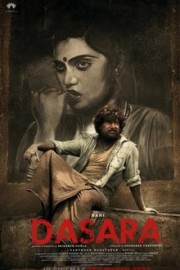Dasara
The only things that “Dasara” and “RRR” have in common is Telugu as it’s native language, they are ultimately films about rebellion and friendship, and the use of music is fundamental to its storytelling. Beyond that, they are very different experiences, but both are exhilarating and capture a feeling we don’t often get in American action cinema. The main difference in my experiences with both is that I’ve missed “RRR” in theatres, while “Dasara” was a big screen experience, through and through. And it was one I cherish in this early part of the year.
As “Dasara” went through its 155 minute running time, I found moments and set pieces that felt like everything from John Woo to “Seven Samurai” to Michael Bay and “300” to even the goofiest underdog sports movie, but some of the most riveting sequences in this film are almost uniquely this film. It’s fair to say that the screenplay is not terribly original, and plays off of a lot of familiar tropes and story beats, but as with “RRR,” it’s the execution where the film hits us with a blast of pure originality. The director, Srikanth Odela, envelope us in a world that feels both lived in, and bigger than life.
The story revolves, simply, about two friends in love with the same woman, and the politics of alcohol consumption in a village in the 1990s. The center of the village is two different places and times- a bar where whomever controls the bar controls the village, and the Dasara festival. It’s at the latter when we first see Dhanari and Suri as kids, and they see Vennala. For Dhanari, it’s love at first sight, but he represses his emotions so that Suri can pursue her. As adults (with Dhanari played by Nani, Suri played by Dheekshith Shetty and Vennala played by Keerthy Suresh), they are part of the lower caste, and are not above stealing coal for the village, and money. One of the people they must deal with is Chinna Nambi (Shine Tom Chacko), the son of a prominent businessman who has his eyes on controlling the village through the bar. That doesn’t even begin to cover where this film ultimately leads.
I doubt any modern Indian film I ever write about will not give me something to say about the music. In a way, the songs in both this and “RRR” function as respites in the action that capture something emotionally or thematically in the film, but what composer Santhosh Narayanan is doing here has arguably more in common with the operatic tradition of composition than musicals. A lot of the film’s songs function as equal parts exposition and emotional outpouring from the characters, and even if there isn’t a breakout song like “Naatu Naatu,” listening to these songs apart from the film does what any great soundtrack should do- conjure memories of the film, and moments that stuck out for us. You won’t understand the lyrics unless you understand the language, but the feeling of what the film invoked with return upon re-listen.
One of the things that marvels me about a film like “Dasara” is how, even when we’re watching quiet moments play out, everything feels larger than life, but in a way that American filmmakers can rarely make feel grounded to reality. That might be because, regardless of context, everything in something like a Michael Bay film or a superhero film is made to seem like the most significant thing ever to happen, and it truly takes a special filmmaker to find that balance. That might be because few characters in those films are truly normal individuals. Nani’s Dhanari is presented as an almost mythic figure in performance, but we still feel a helplessness in him at key times in this film that resonate with us, especially when faced with Suri and Vennala. His big action moments thrill us, but- in the film’s most riveting action sequence- he finds himself running and hiding with everyone else when someone makes a power play in the village. That sequence is one I was thinking about when I said some moments felt almost unique to this film; it plays like a traditional chase scene, but it isn’t shot and edited in a traditional way. That is a big reason why the climax of it lands so powerfully- it also sets in motion the second half of the film, with the stakes reset in ways we won’t even realize until later. This is an example of how filmmakers can use craft to elevate straightforward narrative, and like “RRR,” it’s something American filmmakers would do well to study.
I really do hope to get more into Indian cinema after films like this and “RRR.” It feels like filmmakers there are doing the same type of thing American filmmakers do, but with a better understanding of building worlds from the ground up, especially if that means focusing on common people. “Dasara” isn’t about superheroes, but that’s part of why it makes some of the actions in this taken feel heroic. This is about survival on a daily basis, not planet-wide apocalypses, something action films used to be about on the reg.










